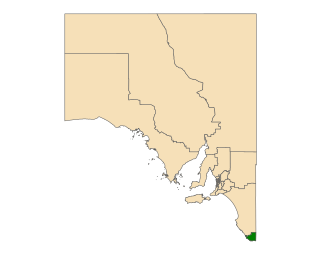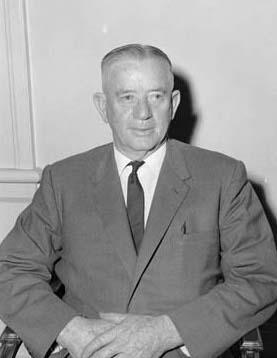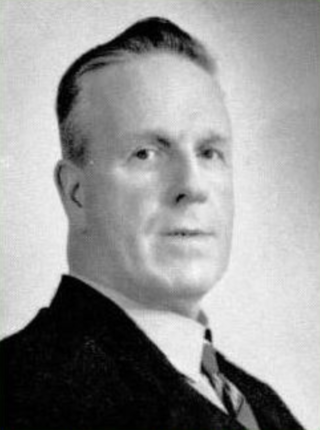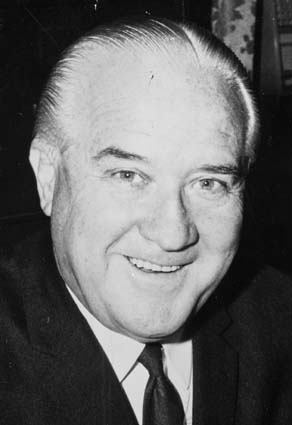Related Research Articles

The House of Assembly, or lower house, is one of the two chambers of the Parliament of South Australia. The other is the Legislative Council. It sits in Parliament House in the state capital, Adelaide.

James Desmond Corcoran AO was an Australian politician, representing the South Australian Branch of the Australian Labor Party. He was the 37th Premier of South Australia, serving between 15 February 1979 and 18 September 1979. He also served as the 1st Deputy Premier of South Australia in 1968 and again from 1970 to 1979.

The Division of Barker is an Australian Electoral Division in the south-east of South Australia. The division was established on 2 October 1903, when South Australia's original single multi-member division was split into seven single-member divisions. It is named for Collet Barker, an early explorer of the region at the mouth of the Murray River. The 63,886 km² seat currently stretches from Morgan in the north to Port MacDonnell in the south, taking in the Murray Mallee, the Riverland, the Murraylands and most of the Barossa Valley, and includes the towns of Barmera, Berri, Bordertown, Coonawarra, Keith, Kingston SE, Loxton, Lucindale, Mannum, Millicent, Mount Gambier, Murray Bridge, Naracoorte, Penola, Renmark, Robe, Tailem Bend, Waikerie, and parts of Nuriootpa and Tanunda.
Since 1970, the South Australian House of Assembly — the lower house of the Parliament of South Australia — has consisted of 47 single-member electoral districts consisting of approximately the same number of enrolled voters. The district boundaries are regulated by the State Electoral Office, according to the requirements of the South Australian Constitution and are subject to mandatory redistributions by the South Australian Electoral Districts Boundaries Commission in order to respond to changing demographics.

Fisher was an electoral district of the House of Assembly in the Australian state of South Australia. It was created in 1970 and named after Sir James Fisher, a colonial politician and the first mayor of Adelaide. It was abolished in a 2016 redistribution and its last MP, Nat Cook was elected to represent its replacement, Hurtle Vale, at the 2018 state election. It covers a 94.2 km2 suburban and semi rural area on the southern fringes of Adelaide, taking in the suburbs of Aberfoyle Park, Chandlers Hill, Cherry Gardens, Coromandel East, Happy Valley, Reynella East and parts of Clarendon, O'Halloran Hill and Woodcroft.

Chaffey, created in 1936, is a single-member electoral district for the South Australian House of Assembly. It covers the Riverland region of South Australia including the towns of Renmark, Berri, Barmera, Loxton and Waikerie. The seat is named after brothers George and William Chaffey who established the irrigation area along the Murray River from 1886.

Mount Gambier is a single-member electoral district for the South Australian House of Assembly. It covers the far south-east corner of the state containing the City of Mount Gambier and District Council of Grant local government areas. It is centred on the city and extinct volcano of Mount Gambier.

Albert Redvers George Hawke was the 18th Premier of Western Australia. He served from 23 February 1953 to 2 April 1959, and represented the Labor Party.
The Playmander was a gerrymandering system, a pro-rural electoral malapportionment in the Australian state of South Australia, which was introduced by the incumbent Liberal and Country League (LCL) government in 1936, and remained in place for 32 years until 1968.

State elections were held in South Australia on 12 July 1975. All 47 seats in the South Australian House of Assembly were up for election. The incumbent Australian Labor Party led by Premier of South Australia Don Dunstan won a third term in government, defeating the Liberal Party of Australia led by Leader of the Opposition Bruce Eastick.

State elections were held in South Australia on 30 May 1970. All 47 seats in the South Australian House of Assembly were up for election. The incumbent Liberal and Country League led by Premier of South Australia Steele Hall was defeated by the Australian Labor Party led by Leader of the Opposition Don Dunstan.

The 1968South AustralianState election was held in South Australia on 2 March 1968. All 39 seats in the South Australian House of Assembly were up for election; 38 of the 39 contests were won by candidates from Australia's two major political parties. The incumbent Australian Labor Party and the Liberal and Country League both won 19 seats. The sole independent candidate to win a race, Tom Stott of the Ridley electorate, joined with the LCL's 19 seats to form a coalition government that held a 20 to 19 majority, thus defeating the Dunstan Labor government.

State elections were held in South Australia on 6 March 1965. All 39 seats in the South Australian House of Assembly were up for election. The incumbent Liberal and Country League led by Premier of South Australia Thomas Playford IV, in power since 1938, was defeated by the Australian Labor Party led by Leader of the Opposition Frank Walsh.
Coles was an electoral district of the House of Assembly in the Australian state of South Australia from 1970 to 2002. The district was based in the eastern suburbs of Adelaide.

Albert Victor Thompson was a member of the Australian House of Representatives and the South Australian House of Assembly.
This is a list of members of the South Australian House of Assembly from 1968 to 1970, as elected at the 1968 state election:

State elections were held in South Australia on 3 March 1962. All 39 seats in the South Australian House of Assembly were up for election. The incumbent Liberal and Country League led by Premier of South Australia Thomas Playford IV defeated the Australian Labor Party led by Leader of the Opposition Frank Walsh.

The 1968 New South Wales state election was held on 24 February 1968. It was conducted in single member constituencies with compulsory preferential voting and was held on boundaries created at a 1966 redistribution. The election was for all of the 94 seats in the Legislative Assembly. The Liberal Party, led by Premier Robert Askin, in Coalition with the Country Party of Deputy Premier Charles Cutler, was elected for a second term—the first time that a non-Labor government had been reelected since before World War II.
Millicent was an electoral district of the House of Assembly in the Australian state of South Australia from 1956 to 1977.

The South Australian Labor Party, officially known as the Australian Labor Party (South Australian Branch) and commonly referred to simply as South Australian Labor, is the South Australian Branch of the Australian Labor Party, originally formed in 1891 as the United Labor Party of South Australia. It is one of two major parties in the bicameral Parliament of South Australia, the other being the Liberal Party of Australia (SA Division).
References
- 1 2 "History of South Australian Elections 1857 - 2006 Volume 1: ECSA". Archived from the original on 2 March 2014. Retrieved 25 April 2014.